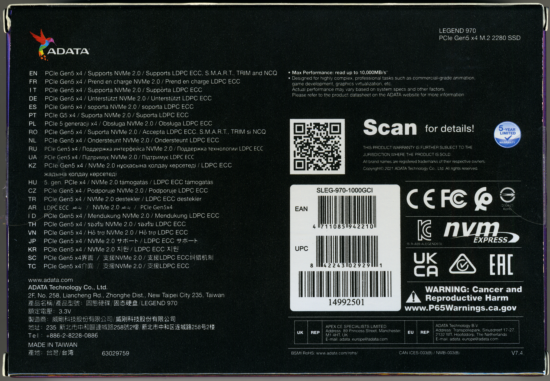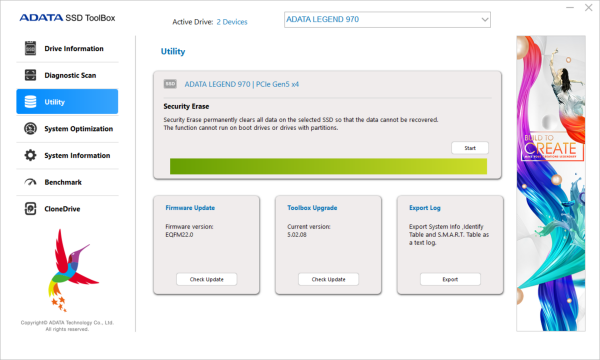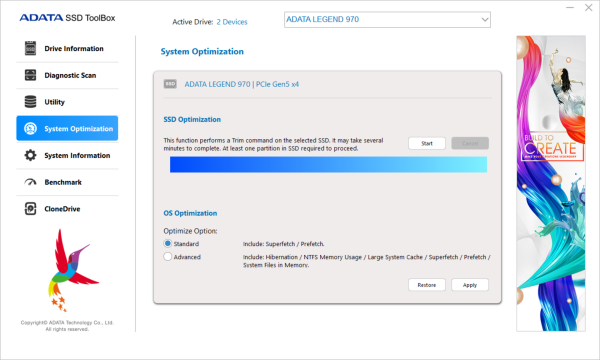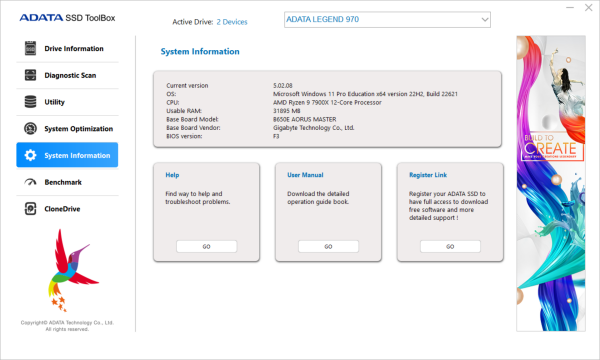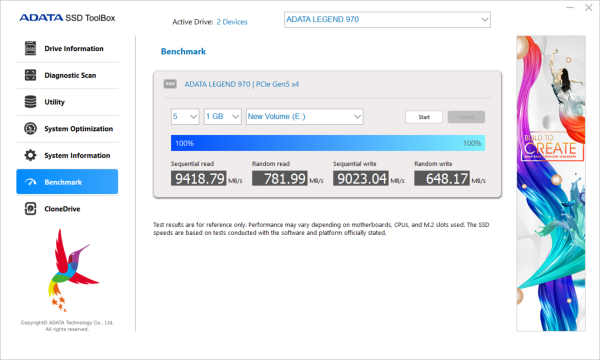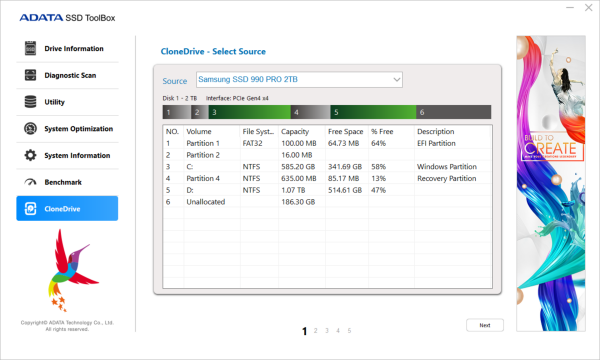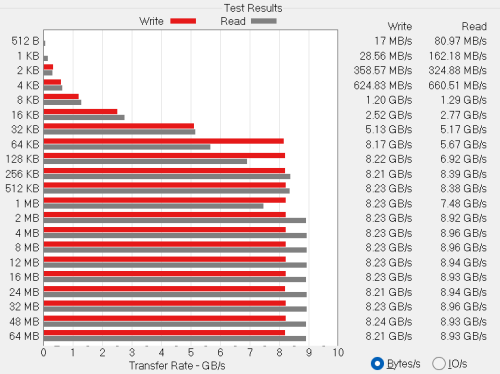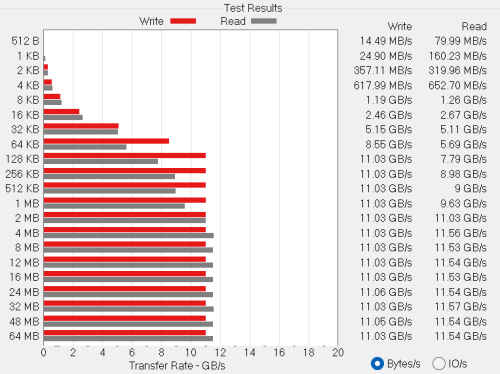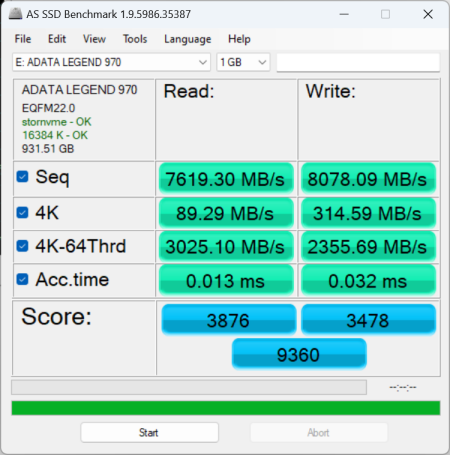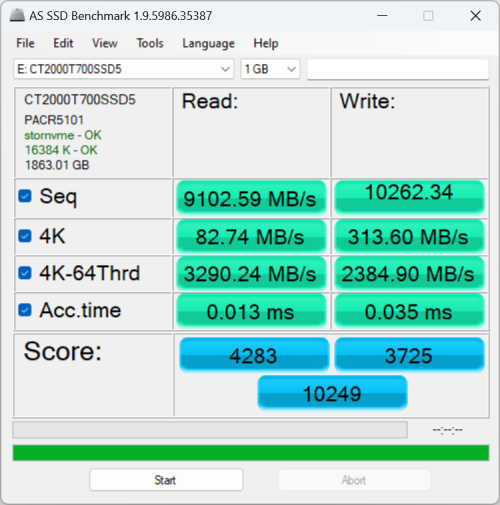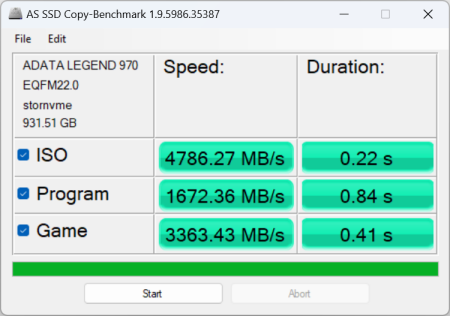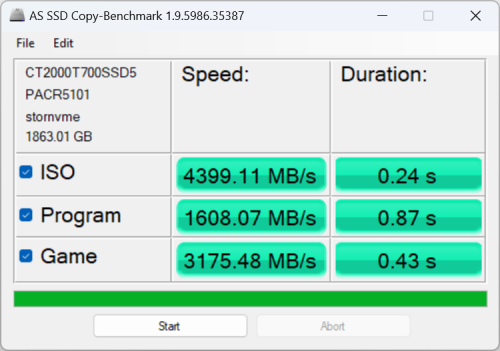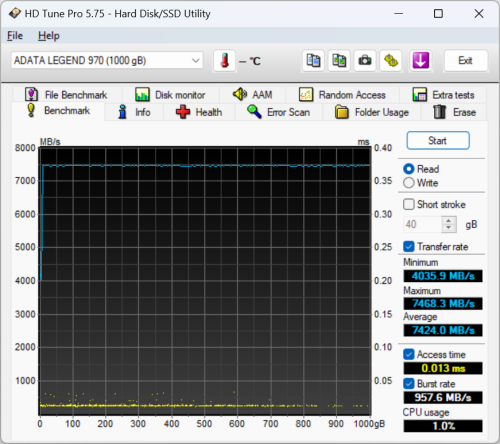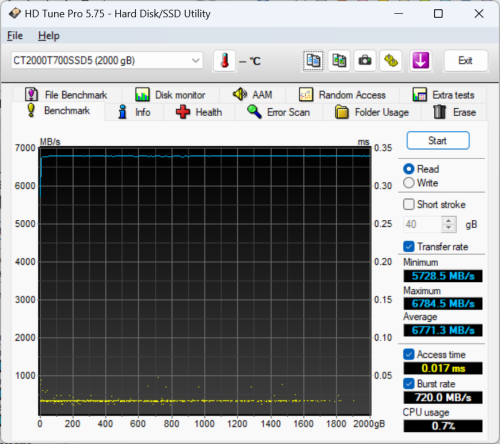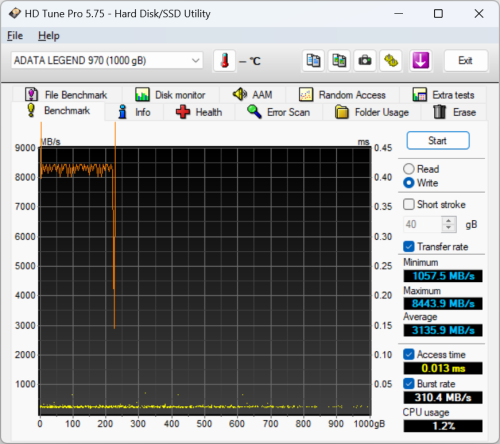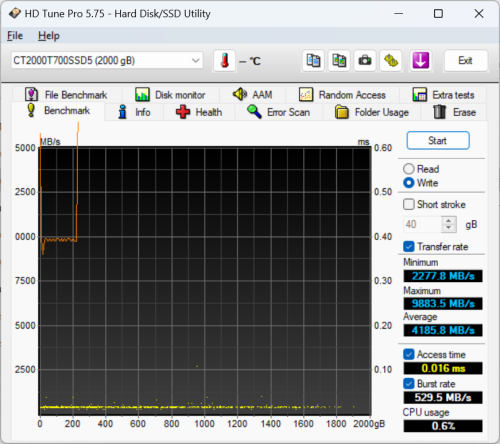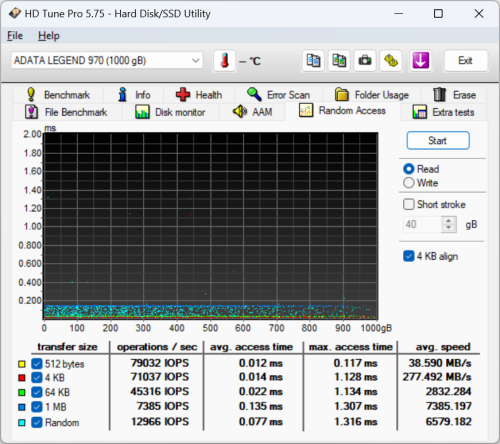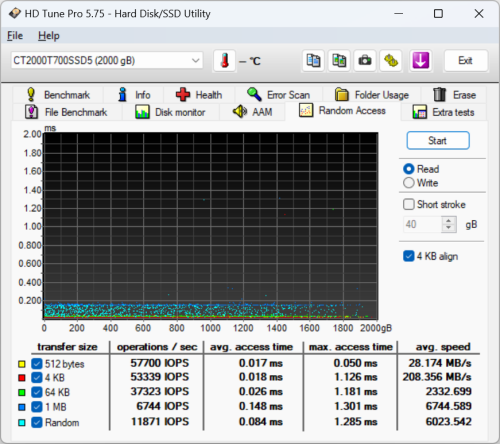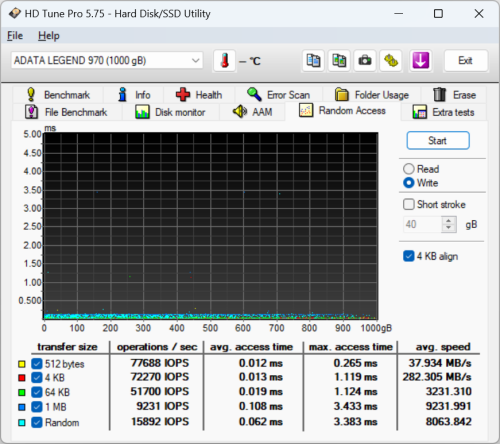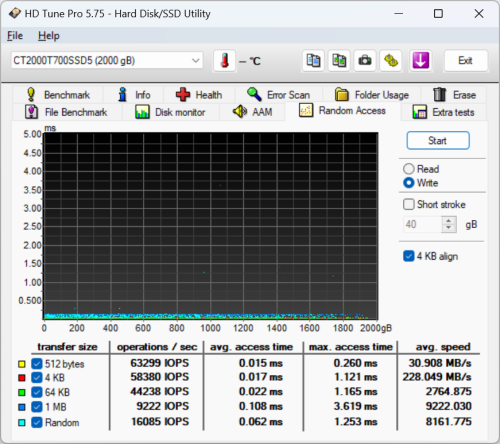

Model: ADATA LEGEND 970 1TB PCIe Gen5 x4 M.2 Solid State Drive
Manufacturer: ADATA Technology
Provided By: ADATA Technology (USA)
ADATA Technology is one of the world's leading manufacturers of high performance memory modules and data storage solutions. Founded in 2001 with a staff of 20, this Taiwanese company set itself apart from the competition early on thanks to its professionalism, industry know-how and eye-catching product designs. Today, ADATA continues to lead the way through constant innovation and development of products that exceed customer expectations. Backed by technical expertise, state-of-the-art manufacturing facilities and premium customer service, ADATA currently offers a variety of products including DRAM modules, USB flash drives, memory cards, solid state drives and portable hard drives.
One of the latest additions to ADATA's line of solid state drives is the LEGEND 970. Designed for enthusiasts, gamers, creators, and professionals who need next generation storage, this M.2 form factor drive is powered by Phison's PS5026-E26 controller and is available with up to 2TB of Micron's industry-leading 232-layer 3D TLC NAND flash. The LEGEND 970 also utilizes dynamic SLC caching and a DRAM cache buffer to improve read and write performance as well as advanced hardware Low-Density Parity Check (LDPC) code technology and AES 256-bit encryption to ensure data security and integrity. To top it all off, the LEGEND 970 is equipped with a double-layer aluminum alloy heatsink with a built-in micro-fan as well as a fast PCIe Gen5 x4 NVMe 2.0 interface to deliver up to 10,000 MB/s read and write speeds.
The LEGEND 960 is available in 1TB and 2TB capacities. For this review, ADATA sent us the 1TB version of the drive which is capable of delivering up to 9,500 MB/s sequential read and 8,500 MB/s sequential write speeds as well as up to 1,300K random read and 1,400K random write IOPS.
| ADATA LEGEND 970 1TB PCIe Gen5 x4 M.2 Solid State Drive | |||||||||||||||||||||||||||||||||||
General Specifications
Performance
Reliability
Environmental
Dimensions and Weight
Other Features
|
Needless to say, this is only a taste of what the LEGEND 970 has to offer. To give you an idea of what to expect, we'll take a closer look at ADATA's new PCIe Gen5 SSD and then see how well it performs. Does the LEGEND 970 have what it takes? Can it deliver the value and performance we've come to expect from ADATA? Keep reading as we find out.
The LEGEND 970 comes in a small black and purple box. Along with a picture of the drive, the front advertises a number of its key features including its 1TB capacity and PCIe Gen5 x3 interface. The back of the box provides a bit more information regarding the LEGEND 970's features and performance.
Physical Features:
The LEGEND 970 uses the 2280 form factor for M.2 (NGFF) SSDs. It measures 80.6 x 24.2 x 17.9 mm and weighs in at 57.1g. The drive also has an "M key" edge connector which provides PCIe SSDs with up to 4x lanes of bandwidth.


The LEGEND 970 features ADATA’s patented active-air coiling solution. The drive is equipped with a double-layer extruded aluminum heatsink as well as a built-in micro fan that draws in cool air through the top and quickly expels heat from both sides of the aluminum fins. The LEGEND 970 also uses "surface crystallization" to increase the overall air contact area and maximize the heat dissipation efficiency of its air cooling system. According to ADATA, this unique "active heat dissipation" design significantly reduces temperatures by 10% when compared to fanless heatsinks.
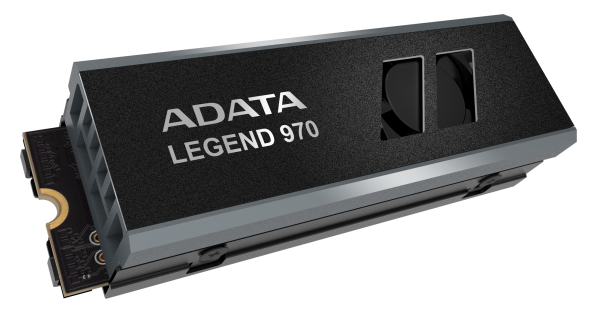
The LEGEND 970's heatsink wraps entirely around the drive and is attached using four screws. While this ensures a solid fit, it also adds about 4mm to the overall width of the drive. This doesn't sound like much. However, you will want to make sure that the card doesn't hit a PCI slot or any of the other components on your motherboard. Also take note that the heat spreader is quite tall (17mm) and that it may interfere with your video card if your motherboard's M.2 slot is below it.
Like most other PCIe Gen5 SSDs, the LEGEND 970 uses Phison's PS5026-E26 controller. Manufactured using TSMC 12nm process technology, this PCIe 5.0 x4 NVMe 2.0 controller is equipped with two ARM Cortex R5 cores and has 8 NAND channels with 32 chip enables (CE) per channel. The E26 also offers support for 3D TLC/QLC NAND flash and features end-to-end data path protection, thermal throttling, SmartECC technology and Phison's fifth generation low-density parity-check (LDPC) ECC algorithm for improved drive reliability.


For the 1TB version of the LEGEND 970, ADATA has opted to use Micron's 232-layer 3D TLC NAND flash. If you'd remove the heatsink, you'd find two 256GB NAND flash packages on either side of the PCB. The drive also has a single 2GB SK Hynix DDR4 SDRAM memory chip that is used for caching.
Like ADATA's other SSDs, the LEGEND 970 works with their SSD Toolbox. This free downloadable utility is an easy way for users to obtain information about their drives and change various system settings. Additionally, it can be used to speed up your SSD, improve the endurance of a drive and clone your data from one drive to another.
When you run ADATA SSD Toolbox, the main screen displays information about your drives. From here, users can view information like the capacity, used space, temperature, health and lifespan of each drive. By clicking on the tabs, you'll also find information like the model name, firmware version and serial number and connection speed.
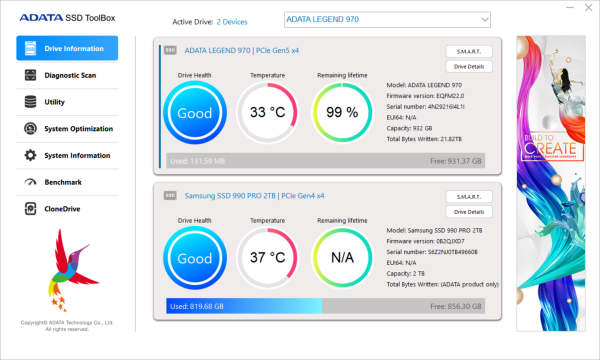
The SSD Toolbox offers two different diagnostic scans. The quick diagnostics scan runs a basic test on free space and is usually completed in under two minutes. The full diagnostics scan runs a read test on all used space and a write test on all free space of the selected drive. Needless to say, the full scan takes much longer to complete.
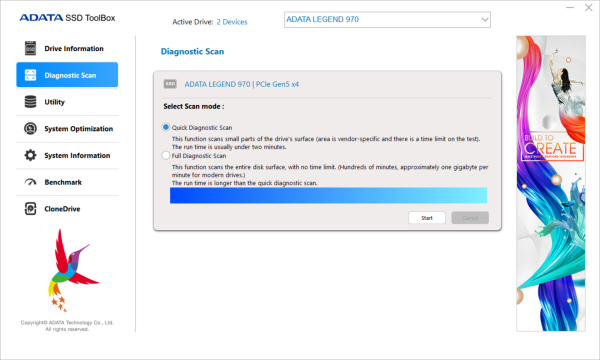
ADATA's SSD Toolbox also includes a number of utilities. Along with the ability to do a secure erase, users can update a drive's firmware, upgrade the software and export a log file containing information about your system and drives.
The System Optimization option gives users the ability to run a TRIM command on a selected SSD. Users also have the ability optimize their OS by enabling features like superfetch, prefetch and automatic defragmentation.
SSD Toolbox can also be used to view information about your system. The utility displays a number of things including the operating system, CPU, amount of usable RAM and the model and BIOS version of your motherboard. There are also links to get help, download a user manual and register your SSD.
With the latest version of SSD Toolbox, you can also benchmark the performance of a storage device. Looking at the screenshot below, you can see that it tests the sequential and random read and write performance of a drive.
Last but not least, SSD Toolbox can be used to synchronously backup data from a partition on one drive to another. The source drive can be from any manufacturer. However, the target drive must be an ADATA one to start the function.
The test system used in this review is equipped with an AMD Ryzen 9 7900x CPU, Gigabyte B650E AORUS master motherboard, 32GB (16GB x 2) of Corsair Vengeance 5200MT/s DDR5 memory, Samsung 990 Pro 2TB SSD and a GIGABYTE GeForce GTX 1060 WINDFORCE OC 6G graphics card. For the operating system, I used the latest version of Windows 11.
To test the performance of ADATA LEGEND 970's SSD, I ran a series of benchmarks using CrystalDiskMark, ATTO Disk Benchmark, AS SSD, HD Tune Pro, Anvil's Storage Utilities, Iometer and PCMark. For comparison, I've also included test results from the Crucial T700, Solidigm P44 Pro, Samsung 990 PRO, ADATA LEGEND 960, Crucial P3 Plus, SK hynix Platinum P41, Silicon Power XS70, WD_BLACK SN770, ADATA XPG ATOM 50, ADATA XPG GAMMIX S70 Blade, Crucial P5 Plus, Plextor M10PY, ADATA XPG GAMMIX S70, Sabrent Rocket 4 Plus, WD_BLACK SN850, Silicon Power US70, ADATA XPG GAMMIX S50 Lite, Crucial X10 Pro, Crucial X9 Pro, ADATA Elite SE880, Kingston XS2000, ADATA XPG ATOM 30, Samsung 980, Silicon-Power UD70, Crucial P2, SK hynix Gold P31 and Crucial P5.
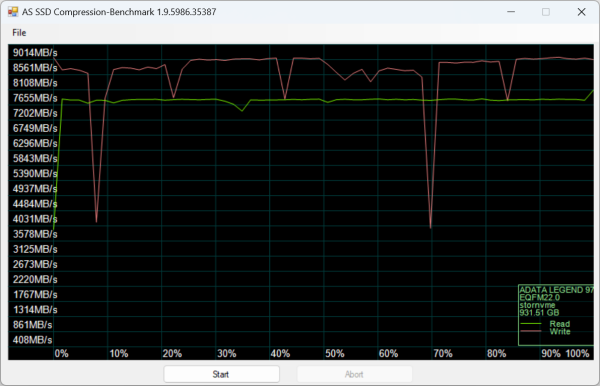
As I mentioned earlier, the LEGEND 970 uses Phison's PS5026-E26 controller chip. Looking at the screenshot above, you can see that it performs equally well with both incompressible (0%) and compressible (100%) data.
CrystalDiskMark 8.0.4:
First, I ran a few quick tests using CrystalDiskMark. This benchmark measures the performance of a storage device by testing its sequential and random read and write speeds. For this test, we're using the peak and real world profiles.
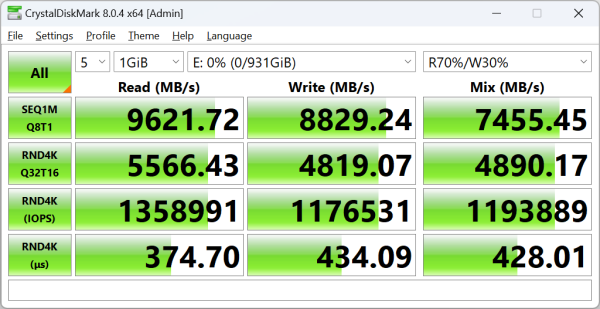
According to ADATA, the 1TB LEGEND 970 is capable of reading at 9,500 MB/s and writing at 8,500 MB/s. As you can see, the drive had no problems reaching these speeds in CrystalDiskMark's sequential read and write tests.
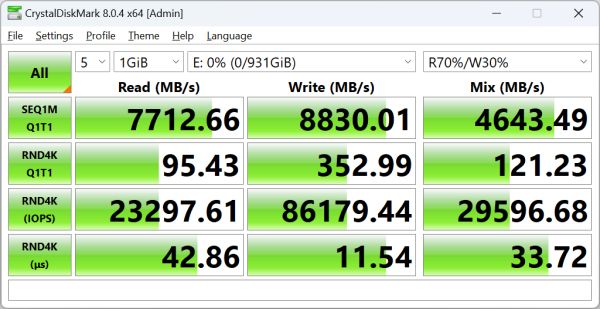
As you'd expect, the LEGEND 970 wasn't as fast when tested with the "real world" profile which uses a single thread and a much lower queue depth. Nevertheless, it was still able to read at 7,712 MB/s and write at more than 8,800 MB/s.
ATTO Disk Benchmark 4.01:
I also used ATTO Disk Benchmark to test the LEGEND 970's sequential read and write speeds. The tests are run using blocks ranging in size from 512B to 64 MB and the total length set to 256MB.
When tested with ATTO, the LEGEND 970's read speeds topped out at about 8.96 GB/s and its write speeds at 8.24 GB/s.
AS SSD:
AS SSD is a relatively new benchmark designed specifically for solid state drives. The application contains five synthetic tests used to determine the sequential and random read and write performance of a drive.
AS SSD also includes a copy benchmark. This test copies an ISO (two large files), program (many small files) and game (small and large files), returning the speed and duration of each.
HD Tune Pro 5.75:
Next, I ran a series of tests using HD Tune Pro. This hard disk utility measures a drive's performance by testing its sequential read and write speeds as well as its access time, burst rate and CPU usage. For this review, I'm also going to use it to benchmark the LEGEND 970's random read and write speeds, random access times and the number of operations per second.
The LEGEND 970 performed relatively well when benchmarked with HD Tune. The drive had average read and write speeds of 7424.0 MB/s and 3135.9 MB/s, respectively.
When reading 4KB blocks, the LEGEND 970 reached 71,037 IOPS and had an average speed of 277.492 MB/s. The drive was even faster when writing, reaching 72,270 IOPS with an average speed of 282.305 MB/s.
Anvil's Storage Utilities:
Anvil's Storage Utilities is another benchmark designed with SSDs in mind. The standard storage benchmark measures a drive's performance by testing its transfer speeds, access times and IOPS.
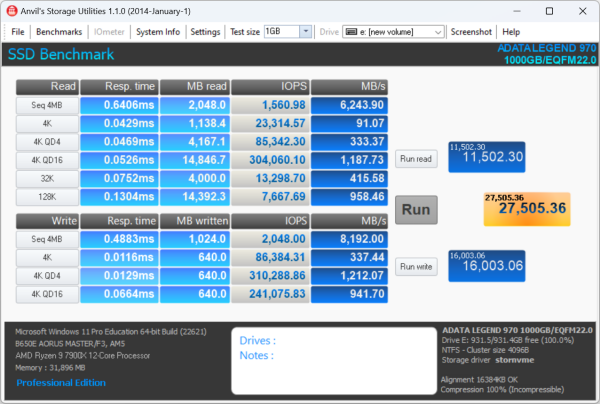
Iometer:
Lastly, I ran a series of tests using Iometer. This tool can be configured to benchmark a number of things. In this case, I used it to measure the LEGEND 970's read and write speeds and the number of operations per second. The tests were run using random bytes and a queue depth of 3.
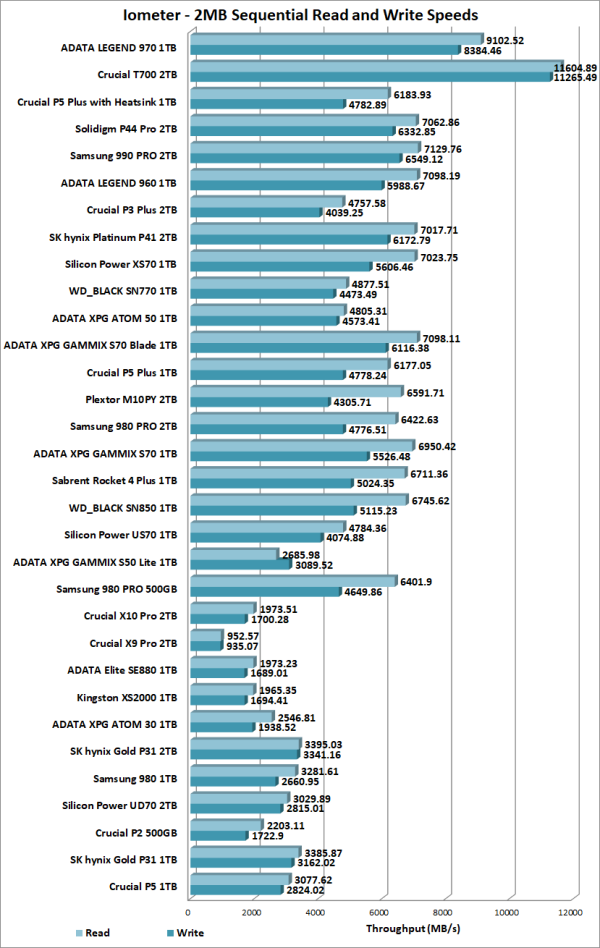
The LEGEND 970's performance was very similar to what we saw in our other tests. The drive was able to read at 9,102.52 MB/s and write at 8,384.46 MB/s.
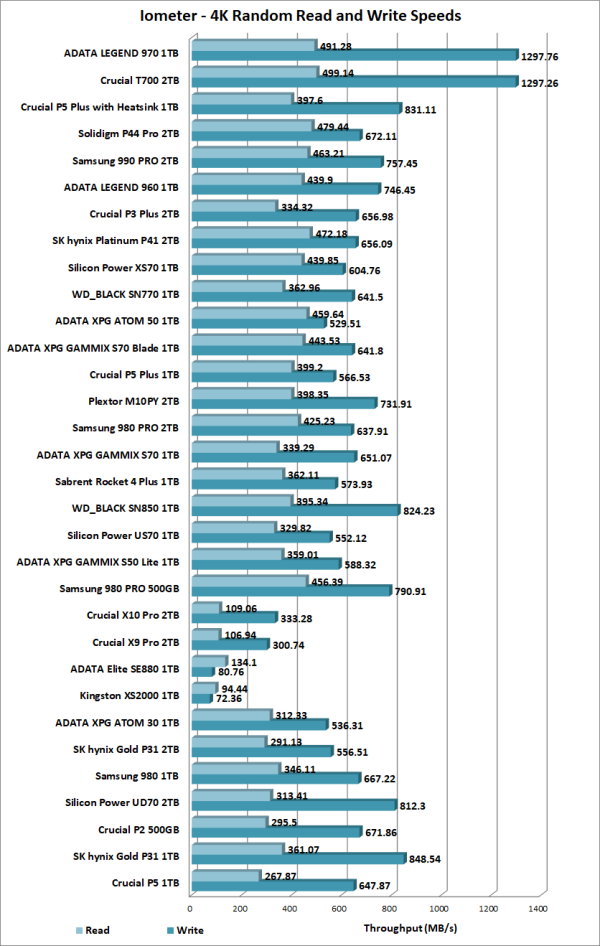
The LEGEND 970 also performed very well when doing random reads and writes. In our tests, the drive was able to read at 491.28 MB/s and write at a blazing 1,297.76 MB/s.
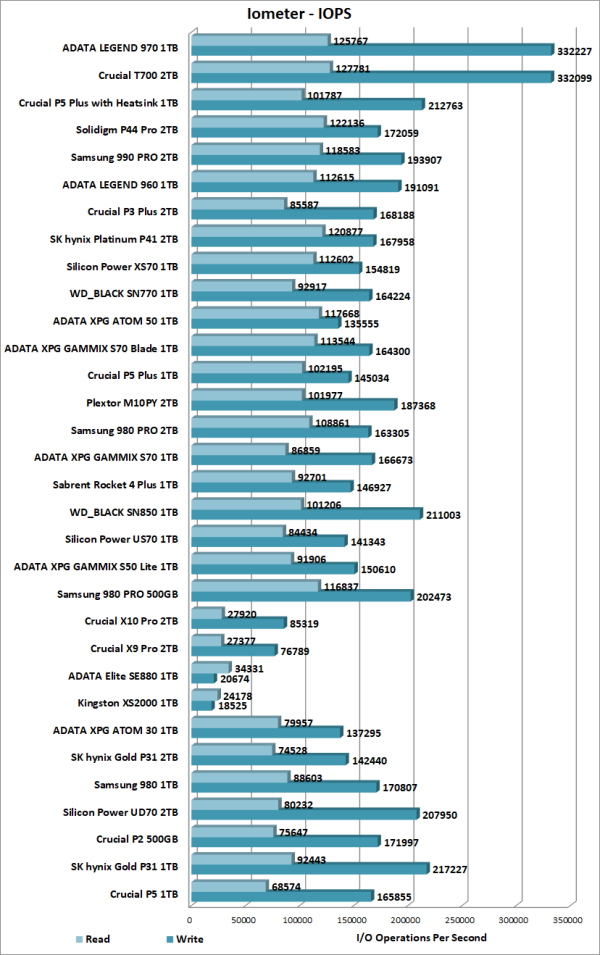
According to ADATA, the 1TB LEGEND 970 is capable of 1,300K IOPS when reading and 1,400K IOPS when writing 4K blocks. With two threads and a queue depth of three, the drive reached 125,767 random read IOPS and 332,227 random write IOPS.
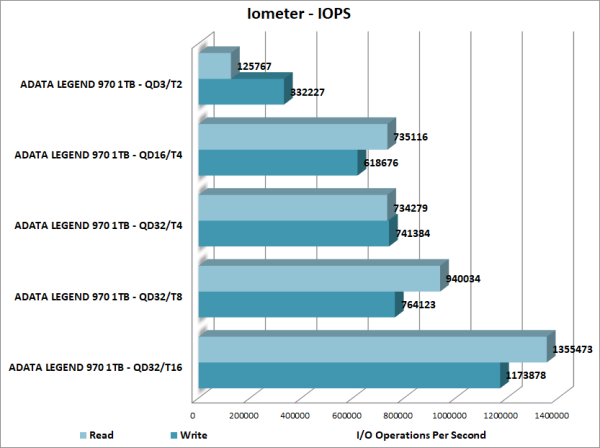
As with most drives, the LEGEND 970 performed better with more threads and at higher queue depths. With sixteen threads and the queue depth set to 32, it reached 1,355,473 random read IOPS and 1,173,878 random write IOPS.
PCMark 8 - Storage Test:
PCMark 8 is a complete benchmark for Windows. It includes five benchmark tests, each designed around a specific scenario. The storage benchmark measures drive performance using real-world traces recorded from Adobe Creative Suite, Microsoft Office and a selection of popular games.
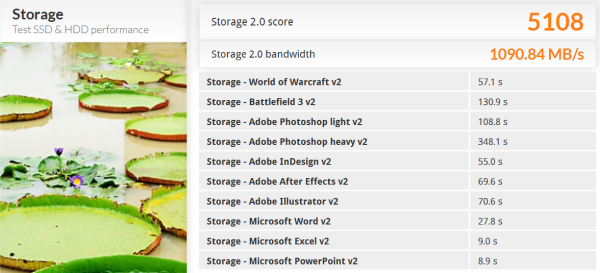
PCMark 8 also includes a consistency test which measures the performance consistency and degradation tendency of a storage system. The test reports the performance level at the start, the degraded steady-state and the recovered state as well as the number of iterations required to reach the degraded state and the recovered state. For this test, we are focusing on the Adobe Photoshop (Heavy) trace and will look at both the bandwidth and latency of the drive
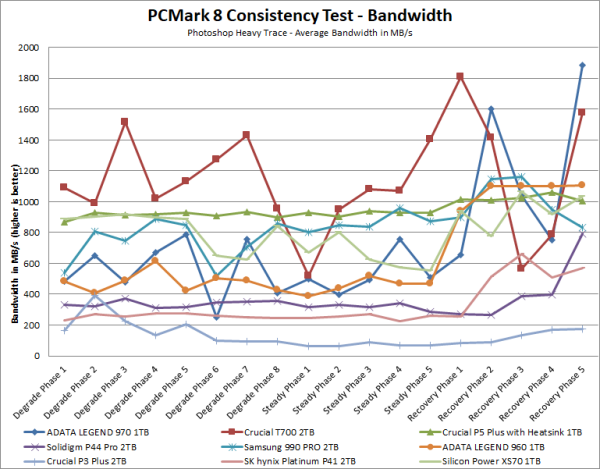
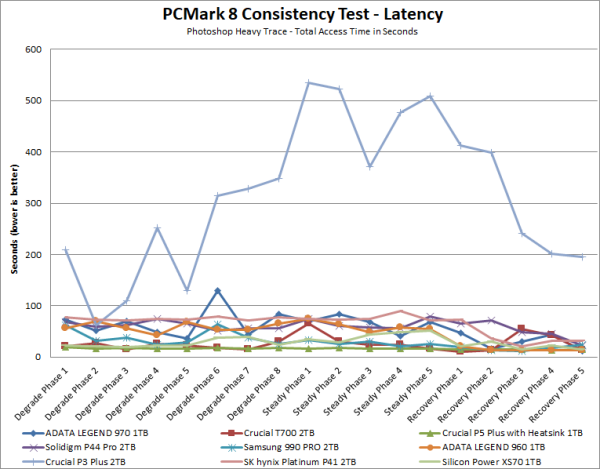
The LEGEND 970's performance was hit and miss in this test. The drive wasn't nearly as fast as the T700 or the P5 Plus during the degradation and steady phases. However, the LEGEND 970 was able to recover, topping out at 1,887 MB/s.
PCMark 10 - Full System Drive Benchmark:
PCMark 10's Full System Drive Benchmark uses a wide-ranging set of real-world traces from popular applications and common tasks to fully test the performance of the fastest modern drives. This benchmark produces an overall score as a measure of drive performance. Comparing devices is as simple as comparing scores. The tests also measure and report the bandwidth and average access time performance for the drive.
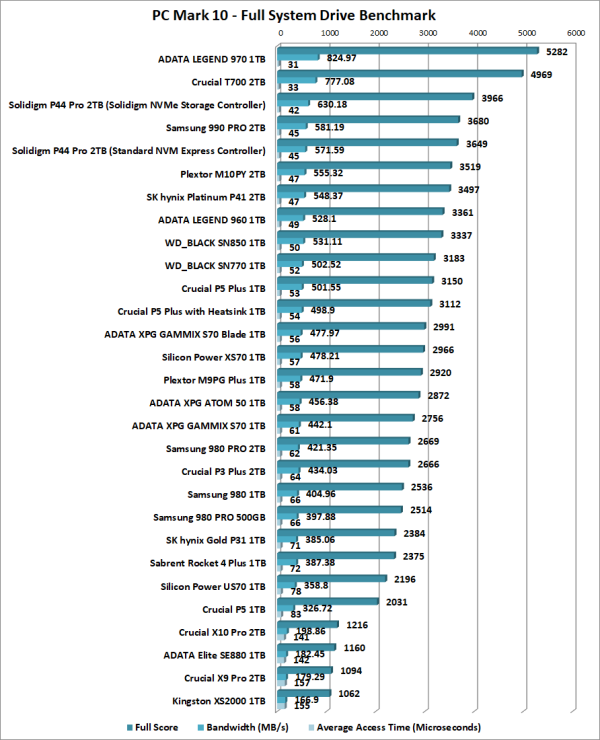
The LEGEND 970 performed surprisingly well in PCMark 10's Full System Drive Benchmark. Despite having slower sequential read and write speeds, it was able to out perform the Crucial T700.
Temperature:
While PCIe SSDs like the LEGEND 970 offer impressive performance, they also generate a good amount of heat. In fact, if your computer doesn't have enough airflow or a large video card covering your M.2 slots, they can get quite hot. To prevent themselves from overheating, most SSDs have implemented a mechanism called thermal throttling which automatically reduces a drive's performance when it reaches a certain temperature.
To keep it from slowing down, the LEGEND 970 is equipped with a double-layer aluminum alloy heatsink with a built-in micro-fan and surface crystallization that improves thermal conductivity. According to ADATA, this cooling system reduces temperatures by 10% when compared to fanless heatsinks.

Needless to say, the LEGEND 970's heatsink did a great job of keeping it cool. The drive's temperature hovered around 35 ºC at idle. When pushed hard, the LEGEND 970 reached temperatures as high as 55 ºC when reading and 57 ºC when writing. With the temperatures staying well below 81 ºC, there was also no sign of thermal throttling.
Final Thoughts:
The ADATA LEGEND 970 is an excellent choice for the enthusiast, gamer or professional looking for an ultra-fast PCIe Gen5 SSD that will stay cool under the heaviest of workloads. This M.2 form factor drive is powered by Phison's PS5026-E26 controller and is available with up to 2TB of Micron's industry-leading 232-layer 3D TLC NAND flash. Combine this with a large DRAM cache and an ultra-fast PCIe Gen5 x4 NVMe 2.0 interface and you have drive capable of transferring data at speeds well beyond that of the fastest PCIe 4.0 SSDs. The 1TB version of the LEGEND 970 flew through our sequential transfer rate tests, reading at speeds as high as 9,621 MB/s and writing at more than 8,800 MB/s. It also did very well in our random write tests, producing more than 332,000 IOPS at low queue depths, and took the top spot in PCMark 10's storage benchmark.
Of course, fast read and write speeds aren't the only things the LEGEND 970 has to offer. Its most unique feature is a double-layer aluminum alloy heatsink with a built-in micro-fan and surface crystallization that forms a patented active air-cooling system. This system significantly reduced temperatures and, as a result, the drive never came close to thermal throttling. The LEGEND 970 also uses dynamic SLC caching to improve read and write performance as well as advanced Low-Density Parity Check (LDPC) code technology and AES 256-bit encryption to ensure data security and integrity. To top it all off, the drive works with ADATA's SSD Toolbox software and is backed by a 5 year warranty.
The LEGEND 970 is available now in 1TB and 2TB capacities and can be purchased through retailers like Amazon for $180 and $300, respectively.

Highs:
- Dual-layer aluminum heatsink with built-in fan
- Available in 1TB and 2TB capacities
- PCIe 5.0 x4 interface with NVMe 2.0 protocol
- Phison PS5026-E26 controller
- Equipped with Micron 232-Layer B58R 3D TLC NAND
- Excellent sequential and random read and write speeds
- Small M.2 2280 form factor
- Large DRAM cache
- Dynamic SLC caching and DRAM cache buffer
- Advanced hardware LDPC ECC technology
- AES 256-bit encryption
- Works with ADATA's SSD Toolbox software
- 5 year warranty
Lows:
- Not the fastest PCIe Gen5 SSD on the market today
- Not available in higher capacities
- Heatsink can cause clearance issues with some motherboards
- Write speed drops when SLC cache is full
- Pricey

